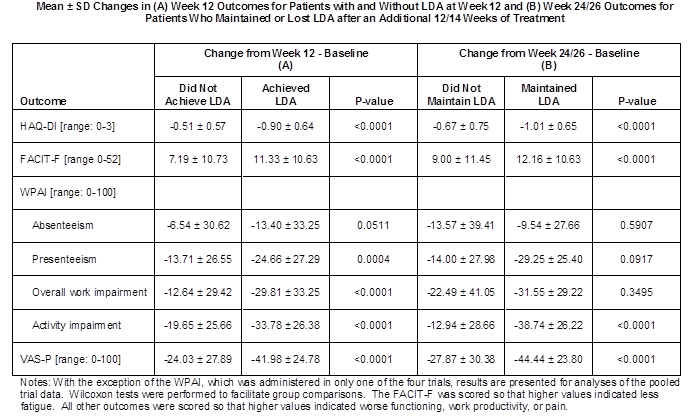Session Information
Session Type: Abstract Submissions (ACR)
Background/Purpose: Treat-to-target (T2T) guidelines for rheumatoid arthritis (RA) recognize low disease activity (LDA) as an acceptable therapeutic goal, particularly in patients with longstanding disease. The guidelines advocate that treatment targets be maintained throughout the course of the disease. A study was conducted to assess associations of patient-reported outcomes (PROs) with achievement and maintenance of LDA.
Methods: Data were taken from four phase II/III randomized trials of adalimumab (ADA), alone or in combination with methotrexate (MTX), vs. MTX monotherapy for the treatment of RA in patients with early or late stage disease. Changes in scores for the Health Assessment Questionnaire Disability Index (HAQ-DI), the Functional Assessment of Chronic Illness Therapy Fatigue (FACIT-F) subscale, the four domains of the Work Productivity and Activity Impairment (WPAI) questionnaire, a visual analog scale measuring pain (VAS-P), and other PRO measures were compared between patient groups defined according to achievement of LDA after 12 weeks of treatment. Among those patients who achieved LDA, changes in PROs were compared between subgroups defined according to maintenance of LDA following an additional 12 or 14 weeks of treatment (based on the timing of study follow up). LDA was defined as having a composite disease activity score based on 28 joints and C-reactive protein (DAS28-CRP-4) <3.2 at a given assessment. The principle analyses were conducted using pooled data from the four trials with additional analyses being stratified by disease duration (i.e., early or late) or treatment received (i.e., ADA or MTX).
Results: A total of 2,533 patients with DAS28-CRP-4 assessments at baseline and after 12 weeks of treatment were included in the study. Compared with patients who did not achieve LDA after 12 weeks of treatment (N=1,820), those achieving LDA (N=713) had significantly greater improvements in scores for the HAQ-DI, FACIT-F, and VAS-P as well as the presenteeism, overall work impairment, and activity impairment domains of the WPAI. Among the 684 patients achieving LDA at week 12 with follow-up at week 24/26, those who maintained LDA (N=557) had significantly greater improvements in scores for the HAQ-DI, FACIT-F, VAS-P, and activity impairment domain of the WPAI than those who failed to sustain LDA (N=127). Similar results were obtained when performing analyses in disease duration and treatment subgroups.
Conclusion: RA patients achieving LDA after 12 weeks of treatment have significantly reduced disability, pain, work impairment, and fatigue compared to those who do not achieve LDA. A similar pattern of differences is observed between patients who maintain LDA and those who fail to do so after 24/26 weeks of treatment. The results of this investigation support the value of achieving and maintaining LDA, as recommended by the T2T guidelines.
Disclosure:
M. J. Bergman,
None;
J. W. Shaw,
Abbott Laboratories,
3,
Abbott Laboratories,
1;
M. Cifaldi,
Abbott Laboratories,
1,
Abbott Laboratories,
3;
G. De,
Abbott Laboratories,
5;
T. He,
Abbott Laboratories,
5;
R. Ayyagari,
Abbott Laboratories,
5;
J. Signorovitch,
Abbott Laboratories,
5.
« Back to 2012 ACR/ARHP Annual Meeting
ACR Meeting Abstracts - https://acrabstracts.org/abstract/patient-reported-outcomes-associated-with-achieving-and-maintaining-low-disease-activity-in-rheumatoid-arthritis/

